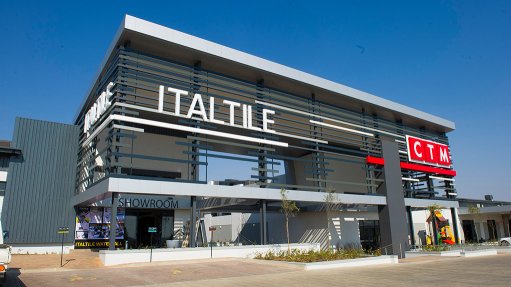
While the economy has shown low growth and decreased consumer spending for some time, JSE-listed Italtile had been shifting its focus for achieving growth to gaining market share, instead of relying on growth from an economic point of view.
CEO Jan Potgieter said on Thursday that this strategy, which involved internal efficiencies and improved productivity, had paid off in the tough trading environment and would continue to do so going forward.
He explained that the efficiency measures that the company had undertaken and would further prioritise this year included centralisation in manufacturing operations, working on processes to incorporate more automation, improved labour scheduling and better resource allocation, as well as driving down costs and improving customer offerings.
The company posted a trading profit of R1.02-billion for the six months ended December 31, compared with a trading profit of R968-million for the six months ended December 31, 2018.
Italtile declared an interim dividend of 23c apiece, compared with a prior interim dividend of 22c apiece.
Across its 197 stores, comprising retail brands CTM, Italtile Retail, TopT and U-Light, the company recorded a retail store turnover growth of 4.5% year-on-year in the six months under review.
The average selling price inflation was estimated at 1.5%, while like-for-like retail store turnover grew 1.7% in the reporting period.
Italtile opened ten new stores in the review period, with another five to eight to follow in the next six months. A further 15 stores were revamped.
The U-Light offering was rolled out in five stores in an initial pilot programme to determine the future viability and scalability of the model. Potgieter said customers had taken well to this offering so far, but that it was too soon to confirm whether the offering would be made permanent. The business, however, broke even during the six months under review.
CTM achieved an improved performance in the reporting period, which Potgieter said was a reflection of the successful repositioning of the brand over the past year and an enhanced focus on in-store presentation and range.
Both sales and average basket value grew, although margin pressure contained profitability. Potgieter confirmed that measures were under way to improve store productivity and should reflect in the next 6 to 12 months.
Italtile Retail’s revenue was flat and profits declined marginally in the review period, while the average basket value increased and margins were maintained.
“A disappointing sales performance was a reflection of the downturn in investment by the shrinking upper-Living Standards Measure market as the flight of capital continued, as well as the decline in the commercial projects business as developments were deferred or cancelled for the foreseeable future,” explained Potgieter.
TopT delivered double-digit sales and profit growth once again, albeit not at the levels achieved in previous years. This business’ margins were down, in keeping with the company’s strategy of supporting cash-strapped homeowners.
An improvement in the average basket value was recorded and store productivity rose. Continued investment in the range and presentation underpinned TopT’s gain in market share in a particularly difficult environment.
Italtile’s manufacturing division achieved sales growth of 1.3%. The estimated average selling price inflation for this division was 1% in the six months under review.
Potgieter told Engineering News that Italtile’s manufacturing operations in South Africa were heavily affected by load-shedding in the six months under review, especially in December when Stage 6 load-shedding was implemented.
The company incurred a direct profit loss of R12-million, on top of increased maintenance costs. The loss for Italtile in December during Stage 6 alone was R4.5-million.
To bypass grid power to some extent, the company was connecting its factories in Vereeniging and Hammanskraal to gas lines, while the company continues to evaluate designs for solar energy.
However, Potgieter pointed out that a transition to solar power would be a long-term project for the company.
Meanwhile, with the implementation of remedial measures, the Ezee Tile business turned around the unsatisfactory performance reported in the prior year; higher volumes and sales were recorded and margins and profitability improved.
All three of Italtile’s import businesses – Cedar Point, International Tap Distributors and Durban Distribution – posted increased sales, profits and margins. Notwithstanding the late arrival of imported stock, Italtile said the product quality, mix and ratio of in-stocks improved.
The establishment of three Cedar Point distribution centres in Gauteng, Cape Town and KwaZulu-Natal also had a positive impact on logistics and distribution efficiencies.
Potgieter mentioned that local manufacturing output in South Africa would continue to decline unless government started protecting local manufacturing.
He expects the company to deliver a similar dividend for the full financial year to end June 30.